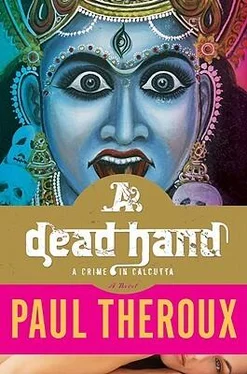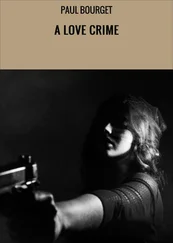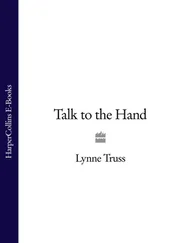On the first morning, seeing Algren sitting alone at his kitchen table having a cup of coffee, reading the newspaper, the wife said, "Are you one of these writers who gets up early and does all his work before breakfast?"
Algren smiled sadly and said, "Nope. I'm one of these writers who doesn't write anymore."
I dialed the number of Mrs. Merrill Unger's cell phone.
"Mrs. Unger's line." A young man's voice, not Indian, but a bit put-on and overformal, making me feel like a petitioner. "Who is calling?"
I told him. He seemed even less interested, did not reply with a word, merely grunted.
"It's for you, Ma," I heard him say.
"Good. You got my letter. When can we meet?"
Her first words — no greeting, all business, a bossy-sounding woman with a deep ensnaring voice.
I said, "I'm staying at the Hastings."
"I have no idea where that is. Why don't you come over to the Oberoi tonight? We can have a drink and go on from there."
This was all too urgent and stern for me, much too insistent. I also felt — like a kind of echo — that she had an audience, some people listening to her auntyness, and that her tone was meant to impress them as much as to dominate me, taking charge and making me do all the work. The Hastings was a comfortable enough hotel; it was snobbish posturing on her part to dismiss it.
Though I had nothing to do, I said, "I'm pretty busy. Tonight's out of the question."
"Tomorrow, then." That same bossy, overconfident tone.
I almost said Forget it. "I'll check my diary."
"What are you waiting for? Check it, then."
I didn't trust myself to say anything except "I'm looking."
"He's checking his diary," I heard her say to her listeners, with a note (so I felt) of satire.
My diary was blank. I smiled as I looked at the empty pages and said, "I'm not free until five," and thinking she might be a bigger bore than she sounded, I added, "I might have something to do later."
"Five, then. We'll be on the upstairs verandah."
She hung up before I did, leaving me angry with myself for having weakened and called her. Looking again at the letter, I found it irritating, and I was further irritated by my own curiosity. I was sure I was wasting my time with this bossy old woman. She was not the first person who'd said to me, I have a story for you. In every case I replied, This is a story you must write yourself. I can't help you. I'm sure you can do it justice.
So I was breaking one of my own rules, giving in to this temptation. I told myself that her letter justified my interest. It didn't have the insubstantial scrappiness of an e-mail. It was written in purple ink on heavy paper; it was old-fashioned and portentous. And I had nothing else to do.
Before I told them who I was and why I'd come, the staff at the Oberoi seemed to know me: the saluting Sikh doorman, the flunky in a frock coat ushering me across the lobby to the colonnade lined with palms in big terracotta pots, and more welcomers — the smiling waitress in a blue sari, the man in white gloves holding a tray under his arm, who bowed and swept his arm aside in an indicating gesture, his glove pointed toward the far table where a woman sat like a queen on a wicker throne, a courtier on either side of her.
I was relieved that she was pretty and slim. I had thought she'd be big and plain, mannish and mocking and assertive. One of the young men was an Indian, and for a moment I thought the woman was an Indian too — she wore a sari, her hair was dark and thick. But when I came closer and she greeted me, looking happy, I realized I was wrong. She was an attractive woman, younger than I'd imagined, much prettier than I'd expected, much better natured than she'd sounded in her letter or on the phone.
"At last," the woman said. "It's so wonderful to meet you. I'm thrilled. I'm so glad you came."
She sounded as if she meant it. I thought, She's nice, and was reassured: it might be bearable.
And at that moment, as she smiled and held my hand and improved the drape of her sari by flinging a swag of its end over her shoulder with her free hand, as Indian women did, I realized that she was not just attractive but extremely beautiful — queenly, motherly, even sexual, with a slowness and elasticity in her manner and movements, a kind of strength and grace. I did not feel this in my brain but rather in my body, as a tingling in my flesh.
"Please sit down. I thought you might not come. Oh, what a treat! What will you have to drink?"
The waiter was hovering.
"Beer. A Kingfisher," I said.
"One more of these," one of the young men said.
"I'm fine," the other said — the Indian.
"My son, Chalmers."
"Charlie," he said. "And this is my friend Rajat."
"Should I have another drink?" Mrs. Unger asked. "I never know what I ought to do. Tell me." She winked at me. "They're in charge. I just take orders."
"Go on, Ma," Charlie said.
"It's only jal, water with a little cucumber juice," she said. "One more." The waiter bowed. "This is Sathya. He is far from home. He knows that I am far from home. Maybe that's why he's so kind to me. Onek dhonnobad. "
" Dhonnobad, dhonnobad. Kindness is yours, madam," Sathya said. He was a gnome-like figure in a blue cummerbund, and round-shouldered with deference. He bowed again, then hurried off sideways, as though out of exaggerated respect.
"Ma babies him," Charlie said. I was still turning "Chalmers" over in my mind. "He loves it."
"I'm the one who's infantilized," Mrs. Unger said. "That was the great mistake the British made in India. They thought they had the whip hand here. They were waited on hand and foot. They didn't notice that the servants were in charge. It took awhile for the servants to realize they had the power. And then the flunkies simply revolted against the helpless sahibs."
Rajat said, "Our love-hate relationship with the British."
"Why on earth would you love these second-rate people?"
"Institutions," Rajat said. "Education. Judiciary. Commerce."
"India had those institutions when the British were running around naked on their muddy little island."
"Road and rail system," Rajat said, but ducking a little. He was a small, slightly built man in his twenties with fine bones and a compact way of sitting. "Communications."
"Self-serving, so they could keep India under their thumb," Mrs. Unger said. Seeing Sathya returning with a tray of drinks, she said, "Ah!"
Sathya set down her glass of juice and the beer.
Charlie said, "They make their own whiskey. That's a great British institution."
"When Morarji Desai was PM he closed down the breweries and distilleries. They turned to bottling spring water," Rajat said.
"Desai had his own preferred drink," Charlie said. "A cup of his own piss every morning." He stared at me. "Did you know that, doll?"
"Chalmers is trying to shock you," Mrs. Unger said.
Rajat said, "Some people think it has medicinal properties."
"I am one of those people," Mrs. Unger said. "I'm surprised Chalmers doesn't know that."
"Ma is a true Ayurvedic. You won't believe the things she eats and drinks."
"But I draw the line at tinkle, efficacious though it may be. I don't quite think my body is crying out for it."
"Ma has healing hands."
"Magic fingers for Ma," Rajat said.
"I try," Mrs. Unger said. She lifted her slender hands and gazed at them in wonderment, as if seeing them for the first time.
She told me about her earliest visits to India, recalling cities and experiences, but because she didn't drop any dates I could not work out her age. Charlie was in his mid-twenties. I took her to be in her late forties — younger than me but forceful, assertive, more confident and worldly, so she seemed older. Charlie did not look like her at all. He was pale, beaky, floppy-haired, languid, his lopsided mouth set in a sneer.
Читать дальше












